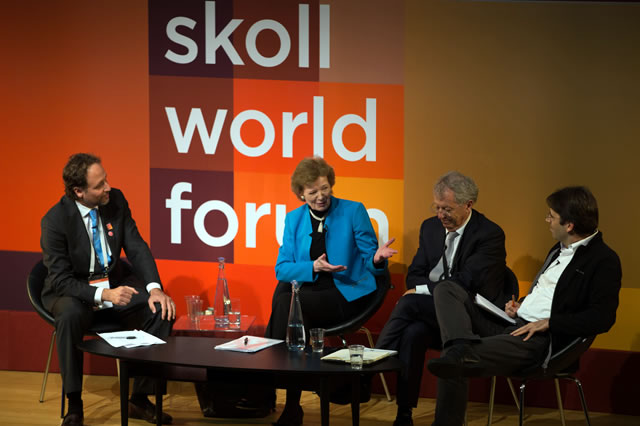Climate Justice and the Two Degree Goal - Why and How?
As we move “from Lima to Paris,” we have a unique opportunity to fight for climate justice. Many countries need access to clean energy to grow their economies and help lift people out of poverty. Others need to provide the same clean energy solutions for consumer-driven economies.
What moral dimensions frame our current future relationship between the developed and developing world with regard to economic growth and energy consumption? How do we accelerate the pace at which countries at all levels of development are making commitments to reach zero carbon by 2050?
These and other questions were addressed at the Skoll Forum’s Zero Carbon the Climate Justice Way session held on Thursday 16 April in the Nelson Mandela Lecture Room at the Said Business School, Oxford.
Moderatated by Ion Yadigaroglu, Managing Principal and Co-Founder, Capricorn Investment Group, Mary Robinson, President, Mary Robinson Foundation – Climate Justice, was joined by panellists Tasso Azevedo, Socio Environmental Entrepreneur, Climate Observatory / Avina Foundation, and Sir David King, Foreign Secretary’s Special Representative for Climate Change, Foreign & Commonwealth Office, in a discussion prompted by a study commissioned by the Foundation on staying below 2 degrees celsius while protecting the right to development.
Opening the panel Mary Robinson outlined climate justice which is at the nexus of climate change, human rights and development:
“I came to climate change not as a scientist or environmental law expert but from a justice and equality perspective. Climate change is, I believe, not just an issue of atmospheric science; it is also about human rights and this is what continues to motivate me to find urgent and equitable global responses to the climate crisis.”
Sir David King underscored the urgency of climate change when he said “climate change is the greatest existential crisis our race has ever had to face”.
By agreeing to keep warming as far below 2°C as possible, the international community implicitly agreed to set a limit on global cumulative carbon-dioxide emissions. Reaching zero carbon is what is required to stay within this “carbon budget” – this can be achieved through a rapid peaking of the world’s carbon emissions, by 2020, and a complete phase out of carbon emissions by 2050.
But the overriding priority for developing countries is development; which requires access to energy. Mary Robinson said:
“We are asking the developing world to do something that has not been done before – to develop without the use of fossil fuels. No country has sustainable development at present. But this is what needs to happen if we are to have a safe world for future generations.”
A lively discussion on sources and use of finance for climate actions ensued. The panel was in agreement on the fact that, with financial support and access to low carbon energy, people in all countries can realise their right to development.
The Skoll World Forum is a programme of the Skoll Foundation and is co-produced with the Skoll Centre for Social Entrepreneurship at the Saïd Business School, Oxford University. Each year, nearly 1,000 distinguished delegates from the social, finance, private and public sectors convene in Oxford for three days and nights of critical debates, discussions and work sessions aimed at innovating, accelerating and scaling solutions to social challenges.
Related Links
Mary Robinson’s Blog: Climate justice is humanity’s greatest challenge
The 12th Skoll World Forum on Social Entrepreneurship
Zero Carbon, Zero Poverty – The Climte Justice Way
Our work on equity and climate justice
“Share Benefits and Burdens Equitably” – Essay by Henry Shue


